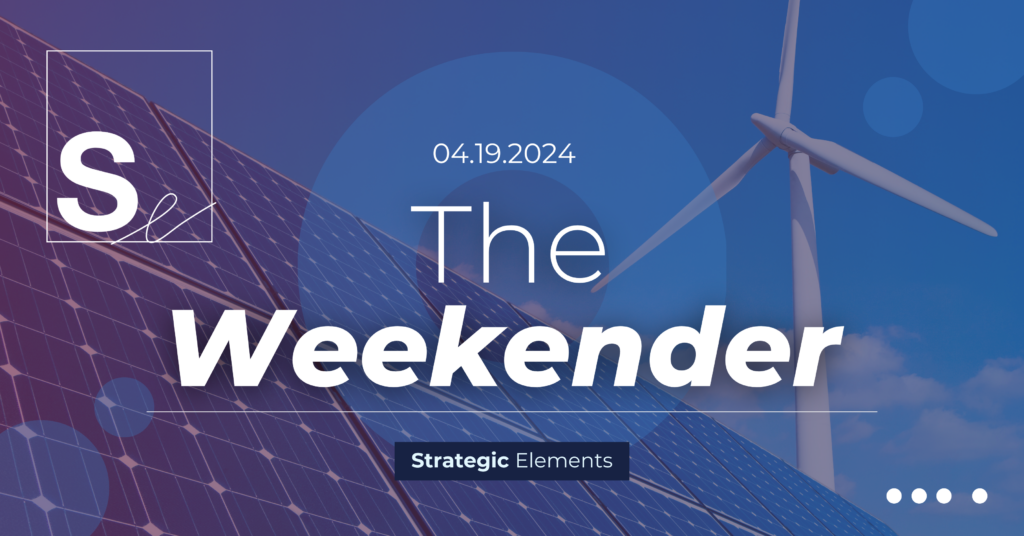DATA POINTS
- 10 Hours: The length of Google employees’ sit-in protest surrounding the company’s work with Israel, ending in arrests this week
- 53%: The percentage of Americans bothered by the complexity of the federal tax system
- 57%: The percentage of U.S. adults who said they would feel better if they got more sleep
- 323: The number of active medication shortages in the first 3 months of 2024
- 2.4 Million: The record number of viewers who watched this year’s WNBA draft
- 2.5 Trillion: The amount the federal government expects to collect in individual income taxes this year; its largest source of revenue
Johnson’s in a Jam
Republicans control 218 seats in the House of Representatives – perfectly matching the 218 votes they need to reach the majority of the chamber. Unfortunately for the party, the tight margin means that any dissension needs to be handled with extreme care. Speaker Mike Johnson, who took the gavel in October 2023, is facing the same heat that burned his predecessor: Members of his own party calling for his ousting. Rep. Thomas Massie and Rep. Marjorie Taylor Greene have joined forces to call for Speaker Johnson’s resignation. Rep. Massie, who sits on the influential Rules Committee, joined Rep. Greene’s resolution over Speaker Johnson’s handling of foreign aid to Ukraine, a government funding package, and for passing a bill to renew a controversial intelligence tool.
Speaker Johnson affirmed press that he will not be resigning despite pressure to do so. Even if the resolution came to a vote, it would need every Democrat and at least three Republicans to vote in favor of it. Fearing the chaos caused by Speaker McCarthy’s removal last year, several Democrats have publicly stated they will vote against it. Rep. Jim Jordan, founding chairman of the hard-right House Freedom Caucus (and one-time contender for Speaker), has committed to keeping Speaker Johnson in his role.
If ousted, Speaker Johnson would be the second Republican Speaker removed by Members of his own party in 6 months. It’s worth noting that Speaker McCarthy’s removal was the first in U.S. history. Since then, several Republicans, including Rep. McCarthy, have resigned from Congress – sharpening razor-thin party lines. With multiple global crises and a looming presidential election, Republicans facing another removal of party leaders does not send a strong message to voters. However, since the resolution only has support from two Republicans, there is likely little to fear (for now) for Speaker Johnson.
Dark Space, Black Market
SpaceX’s Starlink can provide internet to users nearly anywhere in the world by connecting to an array of orbiting satellites. The company is now facing a more terrestrial problem: connections in unauthorized countries. Consumers in Sudan, Zimbabwe, and South Africa received email notifications from Starlink that their connectivity will be ended this month since they are operating in countries where local regulators have not given the greenlight to do so.
Starlink, which launched in 2019, has been swiftly negotiating with regulators around the world to enable access within their country (72 countries have authorized thus far). India and the majority of Africa have not approved Starlink operations, and the company will not offer the service to Russia and China. However, users can purchase the receiver in approved countries, turn on their roaming setting, then move to an unapproved country.
It’s not a new phenomenon for the nascent internet provider; in fact, there’s a black market of Starlink connections born to bypass regulatory restrictions. Middlemen services activate Starlink receivers and distribute kits to unapproved regions. Russian military actors in Ukraine and militias in Sudan have found byways to access Starlink’s services and, with little infrastructure needed to begin internet connection, it may become a growing problem.
Ukraine has claimed that the Russian military is buying receivers through private firms to support their operation’s communications. The Pentagon and Starlink have negotiated a deal to provide Ukrainian forces with the technology, but it is now being used by the opposing force as well. In Sudan, Starlink serves as a critical lifeline for family members to communicate in the war-torn capital of Khartoum, in addition to being used by warring factions. Without regulatory approval, however, Starlink is being forced to shut down operations for these users.
Read More at The Wall Street Journal
Is Craft Beer Going Flat?
The craft beer industry is producing less than capacity for the second year in a row. But despite lower production, more breweries are opening than closing, which is good news for the industry. As competition from new products (like Athletic Brewing Co’s non-alcoholic beer flying off shelves) to Americans’ dry January pervading into dry 2024, production is being lowered to meet the demand of the current landscape. Although the industry reduced its production volume by 5.1%, its retail sales increased by 3%.
The Brewers Association reported that although production is down this year, breweries of all sizes are rising to meet the moment. It mentioned the small breweries, specifically, have become resilient to the market with an increase in production sites, low closing rates, and onsite sales and jobs increasing.
California’s Renewable Milestone

California experts are excited about what this progress could mean for electricity generation – and the impact it could have on consumers’ energy bills. Renewable energy is the cheapest form of generation, they say, lowering costs for consumers. Climate change concerns, plus the undeniably positive economic impact, could lead to bipartisan support for renewable energy in California that has already happened in other states. A mix of red and blue states make up the top 10 states for renewable energy. At 17th place, California could quickly join those ranks as it continues to increase its renewable energy usage.
Gen Z Wants Feedback (Phrased Appropriately)
People born between 1997 and 2002 are starting their careers – they’re learning how to do their jobs, how to engage in a work setting, and what progression systems exist within their companies. With older generations comprising most of the leadership and managerial roles, many Gen Z’ers feel they are not receiving the feedback they need to be successful – or at least they’re not receiving it in the form they appreciate. Timely, collaborative, empathic, and balanced: that’s how Gen Z workers want managers to provide feedback and criticism of their work.
A recent Gallup survey showed Gen Z employees reported the greatest decline in feeling cared about, having chances to learn, engaging in progression discussions, and feeling their opinions matter. While the group being genuinely unvalued at work may be untrue, they increasingly believe it is because of the way feedback is presented to them. Presentation is everything for Gen Z workers because, at the end of the day, they want their manager to help them understand, not just tell them that they are wrong.
Why the cultural shift? A large contributing factor is that Gen Z, raised in the age of the internet, wants more information, and they bring those expectations to the workplace. They want information sharing, learning moments, and growth opportunities to be abundant and frequent. Gen Z also craves immediate feedback so they can learn best practices and apply them as soon as possible, rather than waiting for that 6-month check-in.
Perhaps contrary to popular stereotypes, Gen Z says they want to work – they simply bring their own cultural expectations to the workplace, which could be misinterpreted as laziness, apathy, and disinterest in professional development.
Read more at The Washington Post
Be sure to follow us on Facebook, Twitter, and LinkedIn for more news and industry updates. To receive a copy of The Weekender in your inbox, sign up here.









